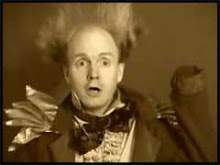 PRETEND: Do the Wrong Thing
PRETEND: Do the Wrong Thing
While sharing similarities with doing the opposite, trying a bad idea, and breaking the rules, doing the wrong thing lets fools break free from the constraints of culturally dictated proper behavior by pretending to be ignorant of etiquette. They act improperly to thwart authority and maybe even authoritarianism.
In his book Clowns, John Towsen describes the medieval practice of "...the Feast of Fools, a New Year's celebration where the minor clergy were allowed to usurp the functions of their superiors and engage in a wide range of blasphemous yet officially approved clowning." Everything gets turned upside down with reverent mockery.
You can get so caught up in being perfect, succeeding at all costs, and knowing you are right, that you effecively block yourself from creative solutions. Imagining and listing the wrong things to do in a situation frees you up to question whether they are truly incorrect or just what the daffy doctor ordered.
You are expected to eat with knife and fork at a steakhouse, but at an Ethopian restaurant, you eat with your hands.
Think: What's the right thing to do? What's the wrong thing to do? How many ways can I act improperly here?
Tomorrow: How to Think Like a Fool #41: Act Crazily
Previous "How to Think Like a Fool" Posts
 PRETEND: Change Identity
PRETEND: Change Identity PLAY: Be Serious
PLAY: Be Serious This is the last fool tool under the category of Play and it's about being absolutely, deadly serious. Stand up straight! Wipe that smile off your face! Have fun!
This is the last fool tool under the category of Play and it's about being absolutely, deadly serious. Stand up straight! Wipe that smile off your face! Have fun! PLAY: Make Music
PLAY: Make Music PLAY: Fool Around
PLAY: Fool Around PLAY: Secretly Cooperate
PLAY: Secretly Cooperate I have an extra copy of
I have an extra copy of  PLAY: Use What's Handy
PLAY: Use What's Handy PLAY: Use More Effort Than Necessary
PLAY: Use More Effort Than Necessary PLAY: Compete with Yourself
PLAY: Compete with Yourself PLAY: Make and Break the Rules
PLAY: Make and Break the Rules
 PLAY: Act without Reason
PLAY: Act without Reason

 PLAY: Manipulate Time and Space
PLAY: Manipulate Time and Space PLAY: Do the Opposite
PLAY: Do the Opposite PLAY: Make Fun
PLAY: Make Fun


